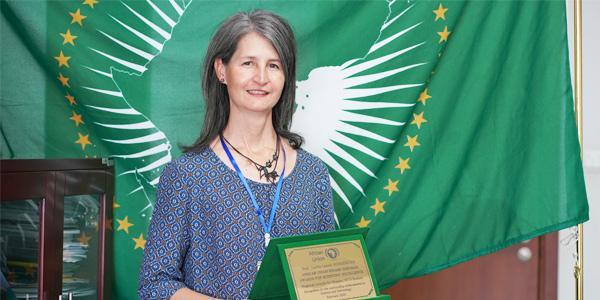The buzz on Wits mosquito scientist and her African Union research award
- Wits University
An entomologist in the Wits Research Institute for Malaria has received the African Union Kwame Nkrumah Award for Scientific Excellence.
Entomology is the study of insects. Research Professor Lizette Koekemoer is Co-Director of the Wits Research Institute for Malaria (WRIM) in the School of Pathology. She received the award in recognition of her contribution to the field of malaria vector control. She was named the regional winner at a ceremony during the Summit of Heads of State and Government in Addis Ababa, on 10 February 2020.

Mad about male mozzies
Koekemoer began her scientific career in mosquito vector control after graduating with a BSc Honours in 1995. A vector refers to an organism that transmits infection, as mosquitos infected with parasites transmit malaria to people. Koekemoer was the lead author for the first time when she published her PhD in 1998, for which she received the Watkins-Pitchford Prize for Best Publication by a Young Researcher at the South African Institute for Medical Research.
Her postdoctoral research interest expanded to include insecticide resistance and the molecular mechanisms responsible for resistance. After realising the extent of insecticide resistance and the threat to malaria transmission, her research interests widened to include the development of additional vector control tools or interventions, e.g., entomopathogenic fungi [a fungus that can act as a parasite of insects and kills or seriously disables them], and the sterile insect technique. This piqued her interest in the novel fields of research on male mosquitoes and transmission blocking studies.
A distinguished research career
Koekemoer has published 108 papers and has supported malaria control programmes across South Africa's provinces, and provided in-country support of malaria control programmes in Mozambique, Zimbabwe, Botswana, Malawi, Nigeria, and Namibia.
Most recently, in April 2020, she co-authored a paper published in The Lancet, which showed how 'smart' interventions in a unique trial in Namibia reduced malaria transmission by 75% .
Beyond Africa, she participated in various World Health Organization activities from 2011 to 2017, as well as in regional and international meetings on the development of the Sterile Insect Technique for Malaria, Zika and Dengue control run by the International Anatomic Energy Agency (Vienna-Austria).
Her research contribution has been publicly acknowledged and she was named second runner-up in the category Distinguished Young Women in Science in 2011. She was awarded the South African Association for Advancement of Science, British Association Silver Medal for the most outstanding scientist under the age of 40 in 2009. She was elected as a Fellow of the Royal Entomological Society (London) in 2007.
Over her 25-year career, Koekemoer has supervised/co-supervised or hosted 74 students and trained numerous scientists, colleagues and students in molecular species-identification and morphological identifications.
